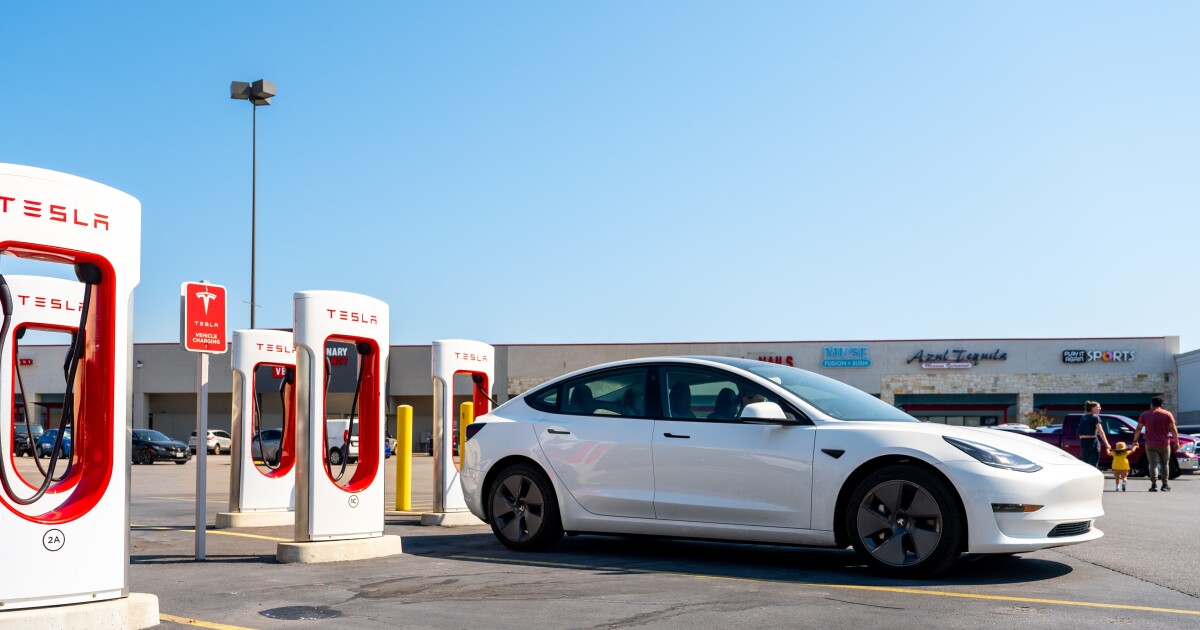Everyone knows that electric vehicles are supposed to be better for the planet than gas cars. That’s the driving reason behind a global effort to transition toward batteries.
But what about the harms caused by mining for battery minerals? And coal-fired power plants for the electricity to charge the cars? And battery waste? Is it really true that EVs are better?
The answer is yes. But Americans are growing less convinced.
The net benefits of EVs have been frequently fact-checked, including by NPR. "No technology is perfect, but the electric vehicles are going to offer a significant benefit as compared to the internal combustion engine vehicles," Jessika Trancik, a professor at the Massachusetts Institute of Technology, told NPR this spring.
It’s important to ask these questions about EVs’ hidden costs, Trancik says. But they have been answered “exhaustively” — her word — and a widerange of organizations have confirmed that EVs still beat gas.



That’s not the equivalent to battery replacements but to the power grid, which of course is yet another win for EV (since clearly distributing the energy source for vehicles over the power grid is safer and more environmentally friendly than needing huge trucks to carry it).
(I’d say battery replacements are closest to motor replacements in gas cars in terms of costs and effort. What about the environmental impact? -> That’s why it’s so costly. To mitigate environmental impact.)
Battery replacements really are not difficult, I’d seriously recommend not imagining obstacles where there are not.
Without special installations, charging takes several hours instead of a quicker battery swap (which you could take with you as extra weight). DC chargers cannot even be installed at how home due to their requirement. Swappable batteries are possible and would make EV cars adaptable to new and different battery technology, they are just not designed that way.
Some, like the XBus, talked about allowing it, and it is perfectly possible, it just isn’t going to come out of traditional car manufacturers who had to be dragged to develop anything EV or manufacturers like Tesla who want to make range a subscription feature. Let’s not even go into EV range extension trailer systems, which would be as effortless as swapping trailers.
So, just so you know, the average EV battery weighs 1000lbs, and some all the way up to 2000lbs in something like the EV hummer. (Unnecessary I know). The cost to have a battery in an EV replaced currently sits around $5000 to $15000 off of warranty. So there are definitely obstacles. Along with letting the general public fry themselves trying to hook up a 400v battery. You’re not dealing with AA batteries. Battery technology is far away from something able to swap out yourself with the ease you may be thinking of.
So, just so you know, you can purchase 96V batteries that weigh less than 30 kg and can be connected in series to provide well over 400V, and if you want more range you can install bigger ones. EV ones weight that much because of the range, which is less of a factor if they can be swapped. They are made up of cells which are individually far below 400v, and there are standardized Anderson connectors that can safely connect and disconnect +600V and are used all the time. The cost of a battery is a non-factor is you are just renting them like you are sort of expected to do with butane tanks. 50V is the limit where you usually begin receiving a shock at, but 400V is not really considered high voltage and can be easily handled with the proper connectors and failsafes, like not swapping with a load.
It’s better than letting the general public fry themselves trying to fuel their cars with an ignitable combustible.You are not dealing with rubbing alcohol. /wildscaremongering
Battery technology is something I’m constantly swapping out for myself with ease, but that’s because I don’t make my own mental blocks. So do owners who retrofit gas cars to EVs. My goal is to retrofit an older EV car so that I don’t have to pay around $5000 to $15000 of overpriced proprietary batteries. It is a long-term goal, but be happy, it is not one that could be shared because the only way to do so would be in a society open to it.
Please let me know how that goes for you and when I can purchase one that allows me to travel 500 kilometres in -25°C without disabling the vehicle mid trip in that mentioned temperature.
You mean for your highly specialized need that the majority of potential EV drivers currently turned off by the step costs don’t need? Sure, let me just make a note, since the solution is scalable, even working in the energy demand of a heater.
Ah yes, I am the only person on the planet who has a need to travel occasionally to a larger city during a normal winter. Got it!
Nice straw man, and a powerfully ignorant one too, given how many EVs it would ignore the existence of simply because they would not fulfill your criteria.
Oh, and I was kidding, no way in hell would I ever give such an antagonist such a leg up, pearls before swine and all, you’ve made your choice and the industry is quite happy to cater to it.
“powerfully ignorant” oh the irony.
EV’s are great to bomb around Cali and similar cities. Practicality drops off substantially in rural settings, and to zero when the temperatures drop well below freezing.
Your fun little idea might gain some traction if you stop being a prick when presented with challenges.
This is already the present; we have power tools that already swap batteries on the fly. The problem is more complex as you add batteries and charge, but not insurmountable. I see the first application in truck fleets.
The problem is that in those cases it is still a proprietary market.